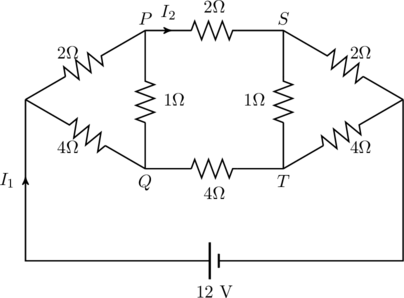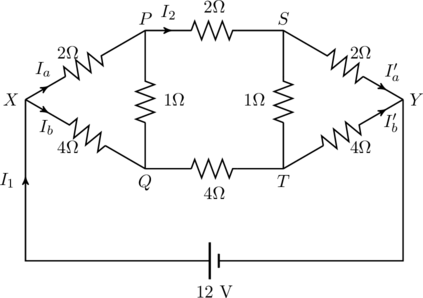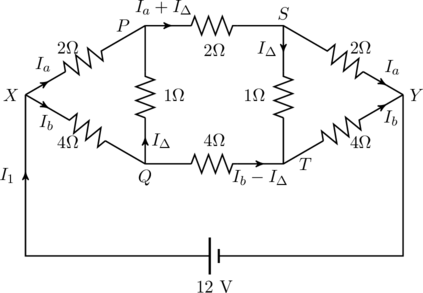JEE Advanced 2012 Paper 1, Question 12
For the resistance network shown in the figure, choose the correct option(s).

- The current through
 is zero.
is zero.  A.
A.- The potential at
 is less than that at
is less than that at  .
.  A.
A.
Solution
We can speed up the solution by noticing the mirror symmetry of the circuit. Let the current ![]() split into two parts
split into two parts ![]() and
and ![]() at the node
at the node ![]() (see figure). Similarly, let the currents going into node
(see figure). Similarly, let the currents going into node ![]() be
be ![]() and
and ![]() . If we were to reverse the polarity of the
. If we were to reverse the polarity of the ![]() battery connected to the circuit, all currents would simply reverse direction, but their magnitudes would remain the same. But then, the currents leaving the node
battery connected to the circuit, all currents would simply reverse direction, but their magnitudes would remain the same. But then, the currents leaving the node ![]() must be
must be ![]() and
and ![]() since, from the battery’s perspective, the circuit looks the same under
since, from the battery’s perspective, the circuit looks the same under ![]() . Thus,
. Thus, ![]() and
and ![]() .
.

By similar reasoning the currents through the 1 ![]() resistors must be the same, and we label these
resistors must be the same, and we label these ![]() . Using Kirchoff’s current law we can fill in the remaining currents through
. Using Kirchoff’s current law we can fill in the remaining currents through ![]() and
and ![]() (see figure below).
(see figure below).

Applying Kirchoff’s voltage law on the loop ![]() ,
,
Similarly, the loop ![]() gives
gives
(1) ![]()
Clearly, both of these equations can only be satisfied if ![]() . So option (A) is correct.
. So option (A) is correct.
Since no current flows through the 1 ![]() resistors and we can treat the legs
resistors and we can treat the legs ![]() and
and ![]() as independent. Then,
as independent. Then,
(2) ![]()
and the total current ![]() is
is
(3) ![]()
The potential at point ![]() is
is ![]() , and that at point
, and that at point ![]() is
is ![]() , and so
, and so ![]() which means option (C) is correct.
which means option (C) is correct.
This, all the given options are correct.